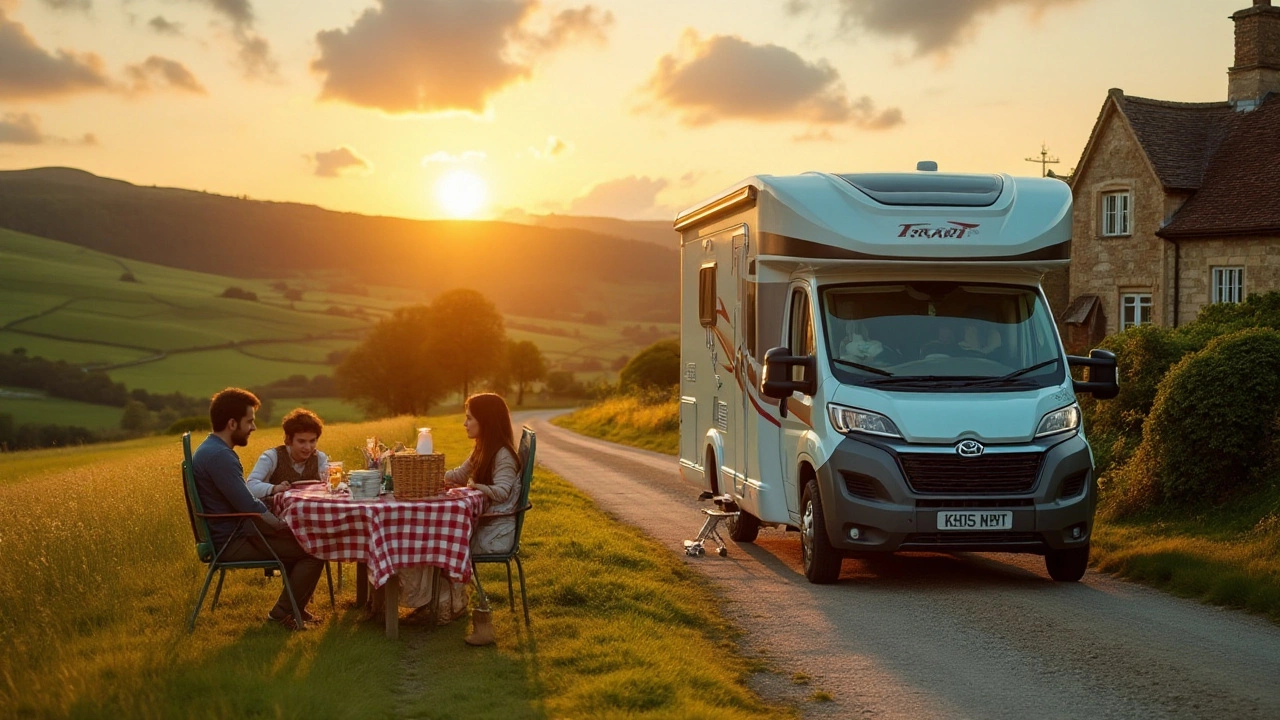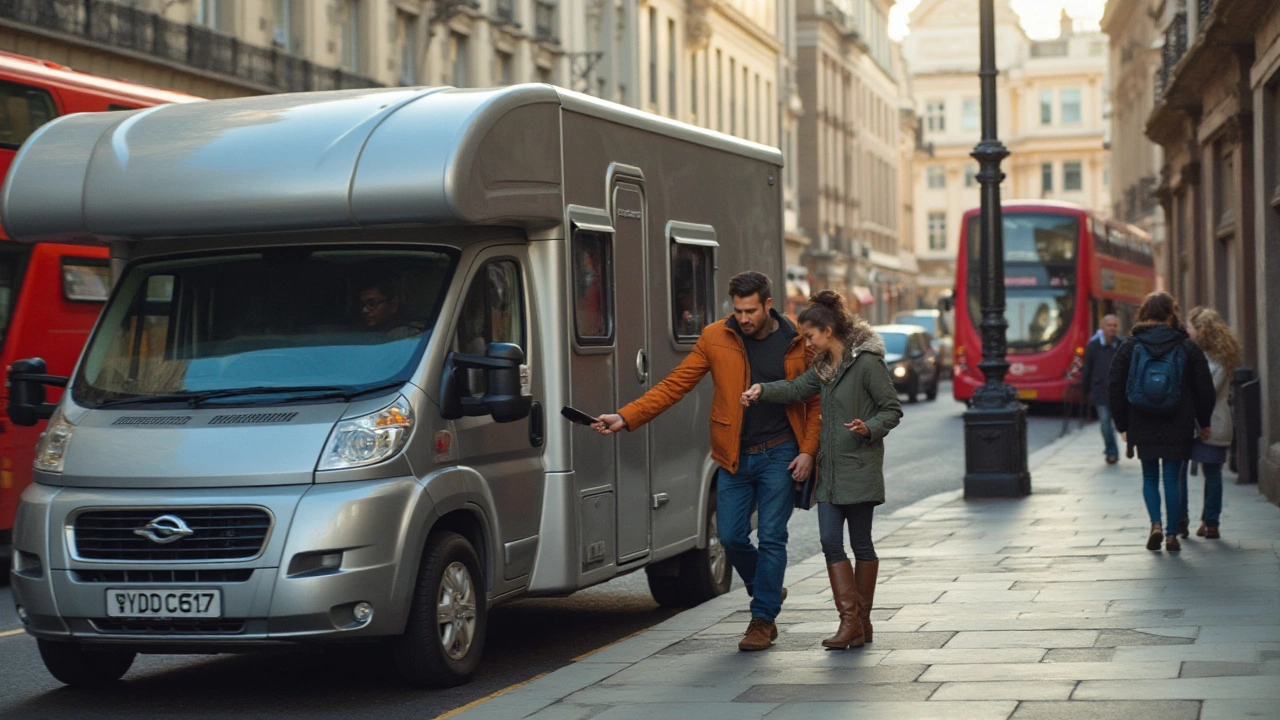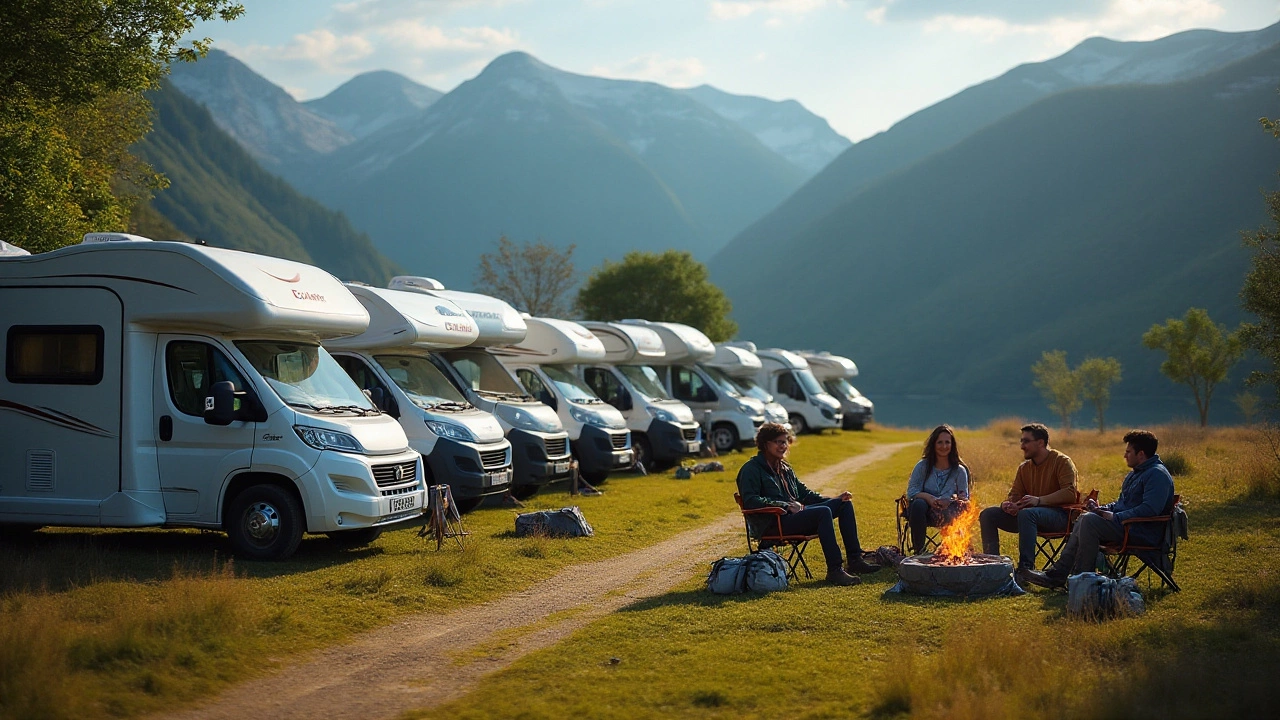Are RVs a Smart Investment for Your Travels?
 Nov, 10 2024
Nov, 10 2024
Rolling across the open highway with the wind in your hair and your loyal companion, Rusty, in the seat beside you, there's no doubt that the lure of RV travel is real. It's the call of the open road and the invitation to explore without the constraint of clocks or hotel checkout times.
But before you embark on this grand adventure, the question remains: is an RV a wise investment? It's not just a decision of practicality but a deep dive into lifestyle preferences and financial considerations. In this article, we'll navigate through the enticing benefits and potential challenges that come with owning or hiring a motorhome.
Join as we explore the allure of RV living, from the freedom it offers to the hidden costs that might surprise you. Whether you're a seasoned traveler seeking the next big experience or a cautious planner weighing every factor, here's what you should know about immersing yourself in the RV way of life.
- The Appeal of RV Travel
- Financial Considerations
- Benefits of Owning an RV
- Potential Drawbacks
- Tips for Prospective RV Owners
The Appeal of RV Travel
Setting out on an endless road trip in an RV is the quintessential dream of freedom for many. There’s something inherently liberating about leaving the constraints of your day-to-day behind. Picture waking up to the sunrise over mountains one day and the gentle lapping of waves the next. It’s not just travel; it becomes a way of life. RVs offer a sense of independence, where the road is your map and the journey is as rewarding as the destination. With a motorhome, your itinerary is yours to craft, allowing spontaneous detours to hidden gems or extending stays in places that capture your heart.
Historically, RV use surged post-World War II as automobile technology improved, enabling travel enthusiasts to explore beyond their familiar confines. Today, these vehicles promise more than mere transportation. Modern RVs are equipped with the amenities of a small apartment: functional kitchens, cozy living areas, and, in many cases, satellite TVs and Wi-Fi connectivity. This means one can revel in rustic landscapes without sacrificing everyday comforts—a tangible dream for avid adventurers and comfort-seekers alike. Travel journalists at National Geographic describe RV adventures as a "gateway to unparalleled exploration," highlighting their ability to connect us with both nature and community experiences along the way.
It's not just the allure of potential adventures that draws people in, but the economic benefits can be compelling. Opting for a mobile base camp can eliminate costs associated with traditional lodgings, sometimes even dining, reducing travel expenses notably. The American RV industry is a robust one, reporting annual growth as more Americans recognize the value in such investments. To this, add the ease of domestic exploration without the hassle of airports and luggage restrictions, and it becomes apparent why more families are embracing the RV lifestyle. The chance to live life on your terms, with Rusty by your side, of course, makes a strong case for RV travel.
For many, it’s about the connections made along the way. RV parks breed camaraderie. Shared stories and campfires bond people of different backgrounds, united by their passion for travel. Perhaps it’s this deeply rooted sense of community that adds to the appeal. For those who yearn for social connections, the RV community offers a network of individuals eager to share tips and tales from the road. According to a Good Sam study, 80% of RV travelers report making lifelong friends, underscoring the social benefits of life on the move.
Financial Considerations
Considering an RV investment requires a clear understanding of various financial aspects. First and foremost, the cost of purchasing an RV varies greatly. Entry-level models can start at around $10,000, while luxury motorhomes can reach up to $500,000 or more. It's crucial to choose a model that aligns with your budget and travel needs. Don't forget to factor in the interest rates if you're financing your purchase, as they can significantly impact the total cost over time.
In addition to the purchase price, there are ongoing costs to consider. Maintenance is one of the most significant recurring expenses. Regular upkeep, such as oil changes, tire replacements, and possible servicing of appliances, can add up. Depending on the usage and model, maintenance can cost thousands of dollars each year. Also, consider the cost of fuel, as RVs are not known for their fuel efficiency. Gasoline or diesel expenses will vary based on the RV's size and the mileage of your trips.
Insurance is another essential component to account for in your budget. It protects you from unforeseen circumstances that can be financially draining. Insurance premiums are determined by factors such as the RV's value, your driving history, and the regions you intend to travel. On average, RV insurance can range from $1,000 to $2,000 annually, but it’s a vital safeguard for your investment. Sales tax and registration must also be factored in, which can be a percentage of the RV's purchase price.
If buying an RV doesn't align with your pocket yet, renting is a viable alternative to experience the lifestyle without a significant financial commitment. RV rental costs can vary widely based on the season, location, and size of the RV. On average, renting can cost between $50 to $300 per day. It's a flexible choice that allows you to enjoy the freedom of travel without the concerns of ownership. Plus, many rental companies offer supplementary features like roadside assistance, further securing your journey.
When determining whether an RV is a smart investment, resale value is a factor that shouldn't be overlooked. RVs depreciate similarly to cars, typically losing about 20% of their value in the first year and continuing to depreciate at a slower rate thereafter. Some enthusiast communities argue that maintaining an RV well can help retain a higher resale value. In the words of lifestyle expert Bill Hittberg,
"An RV can be a wise investment if you weigh your love for exploration against the costs, and always keep it in good shape."Consider also the potential to rent out your RV when not in use, which can offset some of the costs. Peer-to-peer rental platforms have gained popularity, letting owners list their motorhomes for short-term rental, making it a potentially profitable venture.

Benefits of Owning an RV
If you've ever had the urge to leave behind the mundane of daily life and set out on the open road at a moment's notice, you might already understand one of the biggest advantages of RV ownership. Freedom is perhaps the ultimate luxury, and with an RV, your travel plans are never bound by airline schedules or hotel vacancies. Imagine deciding on a Friday morning to spend the weekend in a serene forest by a tranquil lake, your only requirement being to ensure the fridge is stocked with essentials.
Additionally, owning an RV means you are investing in a lifestyle that values flexibility and comfort. You can personalize your space to suit your tastes, from installing solar panels to adding cozy nooks for reading. This personalization not only enhances your travel experience but also provides a sense of home no matter where you park. An RV allows you to bring along your beloved pet, like Rusty, without the stress of searching for pet-friendly hotels, making your adventures all the more enjoyable.
A surprising aspect often touted by RV enthusiasts is the sense of community. Wherever you go, you'll frequently meet fellow travelers who share the same passion for exploration. Campgrounds turn into friendly neighborhoods overnight, where stories are swapped over campfires. This camaraderie can lead to lasting friendships and shared experiences. In fact, some RV owners join clubs and online forums, such as the Escapees RV Club, creating networks of support and friendship all over the continent.
The financial angle is worth noting too. While the initial purchase of an RV can be hefty, the long-term savings on accommodation and the ability to cook your meals on the road can offset those costs over time. In a study conducted by the Recreational Vehicle Industry Association, they found that families save up to 62% on travel expenses by vacationing in an RV instead of traditional travel methods. This provides a clear picture of the potential for travel freedom without breaking the bank.
Finally, having an RV offers unparalleled flexibility. You can chase the best weather year-round or set off for lesser-known destinations that don’t cater to the hotel crowd. You may find yourself staying longer at places you love and moving on from those you don't. This spontaneity is a key reason why many choose to invest in an RV. As author and travel writer Susan Heller once put it,
"When preparing to travel, lay out all your clothes and all your money. Then take half the clothes and twice the money."Though she reflected on traditional travel, the spirit of adaptability resonates deeply with the RV lifestyle.
Potential Drawbacks
While the idea of hitting the highway in an RV, with its promise of adventure and independence, is undeniably appealing, potential owners should tread carefully. Below the surface of this ">RV investment, several challenges can emerge. The first consideration is the cost. It's not just the purchase price that's hefty; upkeep, storage, and insurance can gnaw at your budgets. Regular maintenance is essential to keep your home on wheels roadworthy. Unlike static homes, RVs require attention to both mechanical and electrical systems. Also, navigating an RV, particularly in urban areas, can be a Herculean task due to its size, limited turning radius, and blind spots.
Then there's the aspect of depreciation. Similar to vehicles, RVs tend to depreciate quickly. According to J.D. Power, most RVs lose nearly 20% of their value the minute they leave the lot, and this figure can climb to 40% within the first five years. As opposed to real estate—which often appreciates—this aspect of RV ownership is a critical financial reality check. Parking and storage can become daunting challenges as well. When not gallivanting cross-country, RVs need a place to rest. For those not blessed with ample parking space at home, this means renting storage, which in some areas, isn't cheap.
Weather conditions might lead to unexpected expenses too. An RV isn't a sealed fortress; extreme temperatures can lead to freezing pipes, cracked seals, or overheated interiors, necessitating costly repairs. In addition, gas prices are always a wildcard. Road-trippers need to account for fluctuating fuel expenses, as RVs are notably gas-guzzling giants. Beyond the money, there's the realization that tiny living isn't for everyone. An RV tests relationships and personal space boundaries, potentially leading to what some call "cabin fever." According to author Mary Lou Quinlan, "An RV adventure can begin as a dream but can end as a daunting reality check".
"An RV trip can commence with stars in your eyes but can sometimes end with a stark reality check." - Mary Lou Quinlan

Tips for Prospective RV Owners
Embarking on the journey of owning an RV, whether it's for a weekend jaunt or a life on the open road, demands careful consideration and thoughtful planning. One of the first tips to contemplate is understanding the kind of RV that suits your travel style and needs. From compact campervans to luxury motorhomes, the range is vast and varied. You might be drawn to the agility of smaller RVs that can squeeze into tight camping spots or relish the plush comforts of larger rigs offering ample living space. It's vital to align the choice of vehicle with your lifestyle and travel ambitions. Don't forget to take into account the size of your family or travel companions, including furry ones like Rusty, when deciding on the perfect motorhome.
Next on the list is the budget, a crucial factor that requires early and realistic planning. The initial purchase cost of an RV is just the tip of the iceberg. There's insurance, maintenance, fuel, and unforeseen repairs. Prospective buyers should dive into insurance quotes well before making the purchase to gauge annual costs. Understanding the long-term financial implications is just as important as the immediate outlay. Many seasoned RV owners recommend setting aside an emergency fund specifically for these RV-related expenses. A common piece of advice is
"Prepare for the unexpected; it's not about if it will happen, but when." — Beth Jones, seasoned RV traveler and author of 'The Road Less Traveled'. An emergency fund can be a lifesaver when you are miles away from the nearest town.
An essential, often overlooked tip is to consider renting before buying. Renting gives you the opportunity to test various types of RVs and explore what features are essential versus those that are merely nice-to-have. This trial run can prevent costly regrets and help you make informed decisions before committing to a significant purchase. Another vital component of RV life is familiarity with the vehicle. Driving an RV is a whole different ball game from zipping around in your sedan or SUV. Let's face it, parking alone could turn into a challenging skill set to master. Consider taking an RV driving course, which can build your confidence and ensure safety on the road.
Lastly, maintain a keen eye on storage solutions and travel itineraries. Maximizing space in an RV is both an art and a science. From collapsible kitchenware to multi-functional furniture, wise choices can make a small space feel surprisingly expansive. Planning your travels is also crucial. Though spontaneity is part of the allure of RV living, having an outline of national parks, campsites, and free parking areas can enhance the experience. Using apps dedicated to RV travel can assist in mapping out a fulfilling journey. Remember, the open road awaits, but it's these grounded tips that keep the adventure smooth and unforgettable. Consider all these aspects to ensure that owning an RV becomes a gateway to freedom and discovery, not a roadblock to financial or logistical headaches.